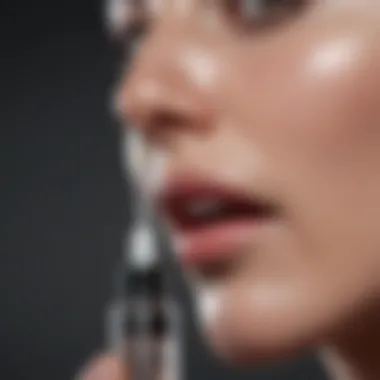Affordable Facial Serums: Your Ultimate Guide to Skincare


Intro
The realm of skincare is often viewed through the lens of luxury. However, affordable facial serums can provide worthy results without demanding an exorbitant budget. This section will provide a succinct analysis of why these serums form an essential part of skincare regimens. It will also unravel some common myths that associate high costs with superior quality.
Facial serums are concentrated active ingredients designed to penetrate the skin effectively. When carefully selected, they can target specific skin concerns such as hydration, aging, and uneven tone. Understanding the composition of these serums is crucial for making informed decisions that suit individual skin types and concerns.
Also noteworthy is the ongoing innovation in the cosmetic industry, which continuously unfolds numerous affordable options without sacrificing effectiveness. The impetus behind this exploration lies in educating the consumer. By narrowing the gap between expectation and reality, readers can discover how to achieve excellent skincare on a modest budget.
Trend Report
Latest Beauty Trends
The beauty landscape is ever-evolving, marked by continuous redefines in techniques and ingredients. Currently, a focus on simplicity prevails. Minimalist skincare routines that emphasize quality over quantity are gaining traction. Consumers gravitate toward products with fewer, well-researched ingredients as opposed to those laden with additives.
Another rising trend is natural and organic formulations. Many companies offer serums incorporating plant-based components, which aim to deliver both effectiveness and safety. This growing concern toward green beauty reflects broader social trends towards sustainability and ethical consumerism.
Essential Ingredients to Look For
The efficacy of a facial serum is intrinsically linked to its selection of ingredients. Key components like hyaluronic acid, vitamin C, and niacinamide have garnered attention for their beneficial properties:
- Hyaluronic Acid: Known for its impressive ability to retain moisture.
- Vitamin C: An antioxidant that protects the skin and can brighten the complexion.
- Niacinamide: Helps in reducing redness and smoothing uneven skin texture.
These ingredients are not only effective but often comprise serums that cater to different financial constraints.
More consumers are starting to understand that effective skincare does not always correlate with price. Affordable brands like The Ordinary and CeraVe have transformed perceptions of what skincare can accomplish.
Seasonal Trends
As seasons change, so do skin necessities. Products suited for summer tend to focus on lightweight hydration and UV protection, while winter demands richer formulations that combat dryness. Keeping this information in mind helps in selecting a serum that adapts to changing environmental factors.
Being engaged with trends allows consumers to make informed choices about which affordable serums align best with current fashions as well as personal needs. This report aims to educate on how to embrace skincare that reflects individual style without splurging excessively.
Prelims to Affordable Facial Serums
Facial serums have increasingly become essential components in skincare routines. They offer a concentrated dose of active ingredients that help target specific skin concerns. This article looks at affordable facial serums, making effective skincare accessible for all. Understanding the value and effectiveness of these products can greatly enhance your skincare regime without depleting your wallet.
The Importance of Serums in Skincare
Serums serve a particular purpose in skincare. Unlike regular moisturizers, serums contain a higher concentration of active ingredients. These potent formulations penetrate deep into the skin, providing targeted treatment for issues such as wrinkles, dryness, and dullness. When absorbed, they can produce remarkable results which are often quicker than traditional creams.
Key benefits of facial serums include:
- Improved skin hydration
- Enhanced skin elasticity
- Diminished appearance of fine lines
- A brighter and more even skin tone
Their lightweight nature means they can be layered under creams or other products. This offers a tailored skincare routine, enhancing the ability to address personal skin concerns efficiently.
Choosing an affordable serum does not mean compromising on quality. Many budget-friendly options offer effective ingredients that solve skin problems without the excessive price tag.
Debunking Myths Around Price and Quality
A common perception is that high price equates to superior quality. This has led to the myth that affordable products may not have effective ingredients or formulation. However, thorough research shows that many inexpensive serums are just as effective, if not more so, than their high-end counterparts.
Multiple factors influence pricing, including packaging, marketing, and brand reputation rather than intrinsic quality.
“Quality affordable products can be just as effective, demonstrating that consumers do not have to overpay for results.”
Understanding the real elements that matter when selecting facial serums—a focus on ingredients and formulation—is crucial. Effective skincare need not stem from extravagant prices. Emphasizing personalization and the right choices helps demystify the skincare process for everyone, establishing a foundation where anyone can navigate the intricate market of affordable facial serums competently.
Types of Facial Serums


Facial serums occupy a unique and significant position in skincare routines. Their concentrated formula allows for targeted delivery of active ingredients, which can address various skin concerns more effectively than traditional moisturizers. Understanding the different types of serums helps in selecting the right product for specific skin needs, ensuring better outcomes and satisfaction. Below are several categories of facial serums that can not only enhance daily skincare practices but also transform one's skin over time.
Hydrating Serums
Hydrating serums are often pivotal for maintaining skin moisture. These serums generally focus on increasing skin hydration levels, a necessity across various skin types. Their main advantage rests in ingredients like hyaluronic acid, which can hold multiple times its weight in water, making it an exceptional humectant. By attracting moisture, these serums can make the skin look plumper and more radiant.
In day-to-day application, a hydrating serum can be layered beneath a moisturizer. This practice amplifies the effect, ensuring that moisture is locked in. Hydrating serums are particularly beneficial after cleansing, as they provide a refreshing layer of moisture before additional products are applied.
Anti-Aging Serums
As the skin ages, it undergoes various changes, which can include loss of elasticity, the formation of fine lines, and uneven texture. Anti-aging serums aim to combat these issues through active ingredients like retinol and peptides. Such ingredients work in tandem to accelerate skin cell turnover and stimulate collagen production, addressing signs of aging effectively.
For effective results, consistency in application is crucial. Many users find that applying anti-aging serum nightly leads to optimal results, but sun protection during the day remains essential, as retinol can increase skin's sensitivity to UV rays. Regular use can fortunately yield a smoother, firmer appearance over time.
Brightening Serums
Brightening serums commonly focus on evening out skin tone and enhancing radiance. They often showcase components like vitamin C or licorice extract, which are celebrated for their ability to diminish dark spots and improve overall luminosity. Incorporating a brightening serum can wake up dull skin and provide a more vibrant appearance, making it an excellent addition for those with uneven complexions.
The application usually pairs well with both morning and evening regimes. Users benefit from applying brightening serums at different times as it maximizes their effect while providing vital antioxidants during the day and repair properties overnight.
Acne Treatment Serums
For individuals prone to breakouts, acne treatment serums serve as a dedicated approach to manage and diminish acne lesions. Often fortified with salicylic acid or benzoyl peroxide, these serums target blemishes, reduce inflammation, and prevent future occurrences. Understanding one’s skin while using these serums is essential, as overuse can lead to excessive drying and irritation.
Many find success in applying acne treatment serums directly onto affected areas post-cleansing. This targeted method ensures that active ingredients could penetrate deeply, offering potential relief for stubborn spots.
Selecting the right type of serum allows individuals to personalize their skincare approach. Tailoring serums to one's specific concerns encourages optimal results and satisfaction.
Understanding these significant types of facial serums is essential for building an effective skincare routine. Leveraging the benefits distinct added benefits of each can lead to a more informed and successful skincare experience.
Key Ingredients to Look For
Selecting a facial serum is not just a matter of price or packaging. The ingredients play a pivotal role in determining the effectiveness of the product. Understanding key ingredients can help you make informed choices. These active components can deliver targeted benefits, addressing various skin concerns from hydration to anti-aging effects. Here's a look at some ingredients commonly found in affordable serums.
Hyaluronic Acid
Hyaluronic acid is a popular ingredient for good reason. It is known for its ability to hold significantly more water than its weight, effectively hydrating the skin. This makes it particularly beneficial for dry skin types or anyone looking to boost skin moisture levels.
When you apply serums containing hyaluronic acid, it draws moisture into the skin and locks it in. Its lightweight texture makes it suitable for layering. Consider their concentration in the product; a higher percentage can deliver better results without causing irritation.
Retinol
Retinol, a derivative of Vitamin A, is well-researched for its anti-aging properties. It stimulates collagen production and accelerates cell turnover, contributing to smoother and more youthful skin. It can help reduce fine lines, wrinkles, and improve skin texture.
However, it is essential to introduce retinol gradually into your routine, especially for sensitive skin types. Some formulations can cause flaking or irritation. Therefore, start with lower concentrations and increase as your skin adapts.
Vitamin
Vitamin C is renowned for its brightening abilities. It combats dullness, evens skin tone, and reduces hyperpigmentation. As a potent antioxidant, it helps protect the skin from environmental stressors, which lead to premature aging.
When selecting serums with Vitamin C, check for stable formulations. Often, Vitamin C is more effective when combined with other antioxidants. The percentages matter as well; formulations containing around 10-20% are optimal for most skin types.
Niacinamide
Niacinamide, also known as Vitamin B3, stands out for its versatility. It hydrates, minimizes pores, soothes irritation, and regulates oil production. It can benefit a wide range of skin types—oily, dry, or sensitive.


For those considering niacinamide serums, concentrations ranging from 5% to 10% generally yield the best results. Plus, it can be combined with other active ingredients without adverse effects. Many users find improved skin texture and tone after consistent use.
Selecting the Right Serum for Your Skin Type
Selecting the right facial serum is crucial for achieving optimal results in your skincare routine. An effective serum addresses the specific needs of your skin type, enhancing your skin’s health and appearance. Since each skin type reacts differently to active ingredients, understanding your unique requirements can save time and resources. Most importantly, it prevents aggravating any existing skin issues while promoting the desired outcomes.
Oily Skin
For those with oily skin, look for serums that incorporate lightweight, non-comedogenic components. Ingredients like salicylic acid are valuable because they help in controlling excess oil production and can assist in preventing breakouts. Additionally, hyaluronic acid serves well, hydrating the skin without adding extra oil. A serum suitable for oily skin will often have a gel consistency that absorbs rapidly, leaving a matte finish.
When selecting an oily skin serum, consider the following:
- Look for oil-free formulations.
- Prioritize ingredients like tea tree oil or witch hazel that can help balance oil production.
- Ensure that it is labeled as non-acnegenic.
Dry Skin
Individuals with dry skin should focus sharpening on moisturizing serums. A good serum should contain hydrating ingredients such as hyaluronic acid or glycerin, which help to attract and retain moisture. Shea butter and oils such as almond or jojoba add further nourishment and repair the skin's barrier, as these ingredients are effective in preventing water loss. The texture should ideally be richer or creamier to provide lasting moisture without compromising absorbency.
Key aspects to consider for dry skin serums include:
- Richer, cream-based formulas that offer nourishment.
- Ingredients such as ceramides to strengthen the skin barrier.
- Avoiding those with alcohol as they can further dry out your skin.
Sensitive Skin
With sensitive skin, caution is necessary. Avoiding harsh chemicals or fragrances will help to minimize reactions. Look for serums that are hypoallergenic and consist primarily of soothing ingredients like chamomile, aloe vera, or calendula. These elements not only hydrate but also promote healing. Products with a simple ingredient list often work best, as they reduce the likelihood of skin irritations.
Considerations for sensitive skin serums:
- Beware of potential allergens and choose gentler alternatives.
- Focus on serums that ease redness or irritation.
- Conduct patch tests before applying the serum to your whole face.
Combination Skin
For people with combination skin, the search for balance is essential. A versatile serum withholding too much oil, cause breakouts in oily areas while still hydrating dry spaces like cheeks. Watch for best ingredients such as niacinamide and hyaluronic acid which provide multiple benefits, offering hydration and oil regulation. Generally, a light gel yet adequately moisturing formulation works well for combating dryness without turning oily areas greasy.
When choosing for combination skin, look for:
- Balancing active ingredients that stabilize oil and moisture levels.
- Best of both worlds in formulation providing hydration and oil control simultaneously.
Top Affordable Facial Serums on the Market
The focus on affordable facial serums serves a crucial purpose in making effective skincare accessible to a wider public. The market holds numerous options catering to varying skin concerns without necessitating a hefty investment. This section not only emphasizes the importance of economic choices that do not sacrifice quality but also showcases how specific brands excel in providing stellar products. Understanding these offerings enables individuals to make astute decisions when selecting products to integrate into their routines.
Brand A Overview
Brand A has earned its reputation for quality products at an attractive price point. Specializing in moisturizing serums, they utilize potent ingredients that enhance hydration levels considerably. This brand offers formulations imbued with hyaluronic acid, ideal for helping maintain skin’s natural moisture barrier.
Many users have praised Brand A for proving that effective skincare does not need to be expensive. Its commitment to using natural extracts showcases their approach to efficacy without overwhelming the skin with synthetic compounds. The end result is an affordable serum that draws upon the power of nature while meeting consumer demand for results-driven products.
Brand B Overview
Brand B distinguishes itself with a focus on anti-aging solutions. Offering serums that contain retinol, this brand understands the significant demand for products targeting age-related concerns. Studies suggest that retinol's effectiveness can diminish, but Brand B’s formulations have maintained a strong customer satisfaction rate.
This commitment manifests in sleep-friendly, lightweight formulations perfect for night usage. Users often report noticeable improvements in their skin’s firmness and smoothness. Brand B emphasizes transparency about their ingredient sourcing, thus appealing to the modern consumer valuing ethical practices.


Brand Overview
Brand C offers serums focused primarily on brightening and evening skin tone. Formulated with Vitamin C as a star ingredient, these products promise an uplifted appearance while targeting dark spots. Brand C's packaging plays a vital role too, preserving the integrity of ingredients which tend to degrade when exposed to light.
Customer feedback highlightsBrand C’s efficacy in delivering visible results progressively, with many stating that their skin seems more vivacious within weeks of use.
Exploring these brands reveals a significant distinction in how affordable serums contribute to skincare. Opting for value-driven products designed with efficacy in mind harmonizes perfectly with the larger narrative of accessible and meaningful skincare.
“Choosing an affordable serum allows you to prioritize your skincare needs without overspending, meaning more thoughtful purchases.”
How to Incorporate Serums Into Your Routine
Incorporating serums into your daily skincare routine can enhance your overall regimen greatly. These products deliver concentrated ingredients to target specific skin concerns. Many users do not maximize the effects of their serums, which results in missed opportunities for improving skin health. It is essential to apply serums properly for the best results, understanding when and how to do so.
Best Time to Apply
The timing of serum application is crucial in optimizing its benefits. For most people, the ideal time to apply serums is both in the morning and at night. Apply serums after cleansing and toning but before any moisturizers or creams. This position allows active ingredients to penetrate deeper into the skin. Using serums in the evening may also be more beneficial as skin renewal happens predominantly at that time. Therefore, considering environment factors and individual lifestyle can guide the most effective routines.
- Morning Routine: Apply a vitamin C serum for antioxidant protection during the day, which helps brighten skin tone.
- Evening Routine: Using retinol can be effective as nighttime application promotes skin regeneration.
- Both Times: Hydrating serums with hyaluronic acid can be helpful at any time.
Layering Techniques
Understanding layering techniques enhances the effectiveness of a serum. It is vital to layer products according to texture and absorption qualities. Here are some best practices for using facial serums:
- Pure Oil Based First: If using an oil-based serum, applying it first can help lock in moisture.
- Thinnest to Thickest: Begin with the thinnest formulations, such as essences or more liquid serums. Follow this with thicker compositions.
- Let It Absorb: Give each product a minute or two to absorb before applying the next one.
- Mixing Sunscreen: If using a serum during the day time, applying it prior to sunscreen ensures maximum skin protection.
To conclude, there are essential techniques to ensure serum efficacy. Proper application time and understanding layering extends their benefits far beyond an ordinary beauty routine.
Potential Side Effects of Serums
Understanding the potential side effects of facial serums is important for those interested in incorporating them into their skincare routines. Even affordable serums, which promise results, can lead to issues like irritation or allergies. Knowledge of these effects empowers consumers to make informed choices.
Understanding Sensitivities
Sensitivity to skincare products can vary greatly among individuals. Different factors, including skin type, the concentration of ingredients, and prior product use, contribute to this variability.
For some, ingredients like retinol or Vitamin C may cause redness and peeling. Those with sensitive skin might already have compromised skin barriers, making them more susceptible to these reactions. Identifying how your particular skin responds to new products is essential. Consider keeping a journal noting any adverse reactions to pinpoint specific triggers.
Common Sensitivities Include:
- Retinol sensitivity: Often leads to dryness or peeling, especially in newcomers to the ingredient.
- Fragrance sensitivity: Artificial fragrances can provoke allergic reactions in delicate skin.
- Acid sensitivity: AHA and BHA can cause tingling or burning sensations.
Being aware of personal sensitivities enables individuals to select serums that align with their unique skin requirements.
Patch Testing Recommendations
Patch testing is a simple yet effective method to foresee possible reactions. This process involves applying a small amount of the serum to a discreet area of skin, such as behind the ear or inside the wrist, before widespread application. It can reveal how the full face will react to a typical use scenario.
Steps for Effective Patch Testing:
- Choose the Product: Pick a serum that intrigues you from available options.
- Clean the Area: Use mild soap and water; make sure the area is free from other products.
- Apply a Small Amount: Place a small dot of the serum on the chosen area.
- Wait 24 Hours: Monitor the area for signs of reaction like redness or swelling.
A positive reaction indicates the serum is likely safe, while irritation or rashes suggest discontinuing use immediately.
Through patch testing, you can significantly reduce the risk of applying unsuitable products to more sensitive areas of your skin. This proactive approach allows for safer and more tailored skincare routines.
Ending: Making Informed Choices
In the complex landscape of skincare, the decision to choose an appropriate facial serum requires careful contemplation. Understanding the nuances surrounding facial serums is vital, especially when it comes to affordable options. As consumers become more informed, they gain the ability to differentiate between effective products and those that may merely claim benefits without delivering results.
Within this guide, we explored the essential elements that contribute to effective skin care using serums, along with considerations for budgeting. Affordable facial serums often provide the same core ingredients and benefits as their pricier counterparts. This realization fosters confidence in spending less without sacrificing quality.



